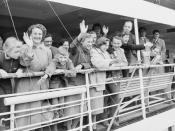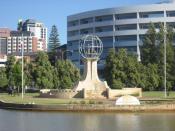In Peter Skrzynecki's poems from Immigrant Chronicle "Feliks Skrzynecki" and "Migrant hostel", he uses a variety of language techniques to demonstrate his views and experiences of migration. In each poem, Skrzynecki uses one particular language feature, among other, less prominent ones, to create meaning and show a change of perspective. In describing his father, Feliks, the poet embellishes many phrases and exaggerates the truth to the extent that the intended meaning is obvious to the responder. Skrzynecki creates two extended metaphors in "Migrant Hostel" to demonstrate his ideas, which we cannot completely comprehend, in a way that we can understand with recognisable ideas and objects.
"Feliks Skrzynecki" is a poem about Peter's father. The change of perspective described in it is the demonstration of the differences between the father's perspective of Australia, and his son's perspective. They each have totally different perceptions of their world because of their differing experiences in life.
Feliks lived in Poland and through World War II, and four years after the end of the war, he and his family up-rooted and settled in a foreign land so different from their homeland that they had trouble adjusting. In Feliks' case, he avoided assimilating to the Australian culture, preferring to stick to his old ways including language, thus alienating himself from the society in which he now lived. In contrast, Peter was born in Europe at the end of the war, and at age four, moved to Australia with his parents. He probably would not remember his life in Europe, and spent only the very early years there. He mainly grew up in Australia so had much more exposure to the new culture and more opportunity to adapt and become a part of it.
"Feliks Skrzynecki" begins with showing the poet's admiration for his father, and describes his loving, caring nature with a simile, "Loved his garden like an only child,". Using words to express Feliks' love for his garden would have been insufficient in giving the audience an understanding. By relating his father's love to a situation and feelings, which can be understood universally, the poet creates meaning. The second stanza continues creating a description of his father, and uses repetition in the describing of actions to indicate the repetitiveness and mundaneness of them, in "From the soil he turned/ And tobacco he rolled". In the third stanza, a clear change of perspective is shown by indicating the author's thoughts. "I thought⦠Feliks Skrzynecki,/ That formal address/ I never got used to" It is clear from these lines that a ritual which Feliks considered a customary formality, caused discomfort for Peter and perhaps even embarrassment. "They dug cancer out of his foot" in the fourth stanza is a callous description of the procedure, and the brutality of Feliks' experience is exaggerated in order to demonstrate his positive outlook on life to a greater extent, in comparison.
The change in perspective begins to be highlighted in the fifth stanza where Peter describes an incident in which it is clear that his father rejected his new culture. Using metaphor to describe the department clerk's actions "Who asked me in dancing-bear grunts" places his father's character quite low, by describing him as being insulted by an animal. He therefore is indicating that at that point, his father was of less worth than a grunting animal. The poet almost condemns his father for not trying to assimilate, but in the sixth stanza he describes the other side of Feliks' personality again, proving that in his opinion, his father is not a bad person. In the last line "Happy as I have never been", indicates Peter's understanding that his father's way of dealing with life, although different to his own, is no worse, and perhaps even better.
The last stanza describes the biggest differences in their perspectives. The responder is given the impression that from when Peter was at the age of 13, He and his father began to diverge in values, lifestyle, and most importantly, perspective of their worlds. "Watched me pegging my tents/ further and further south of Hadrian's Wall." This metaphor indicates the poets change from the Polish culture and his heritage, to the Australian culture and his new life.
"Migrant Hostel" is about his family's experience in the Parkes Hostel, where they stayed for two years. The first stanza describes their uncertainty about the future and about their lives and establishes the perspective of the group of migrants as a whole. The poem is not so much about a change of perspective, as stagnancy, and a desire to keep perspectives the same. "Nationalities sought/ Each other out instinctively -" in the second stanza indicates the migrants wish to stay the same, and to keep their culture and traditions by sheltering themselves. The simile used to describe the migrants as people who looked for others of the same background, "Like a homing pigeon/ Circling to get its bearings" indicated the normality of this situation, and the acceptance of people only associating with people of the same nationality.
The third stanza describes the migrants' awareness of their surroundings by creating an extended metaphor. "We lived like birds of passage -/ Always sensing a change/ In the weather:/ Unaware of the season/ Whose track we would follow." The connection to birds makes the inhabitants of the hostel appear to be relatively insignificant creatures, who did as was expected and no more. The other metaphor used is in the last stanza, of the description of a boom gate as a reprimanding finger. This indicated the migrants' belief that they were made to feel like they had done something wrong. The feeling given in the words "needing its sanction/ To pass in and out of lives" depicts the migrants' feelings that they ere prisoners and their bitterness towards their lack of total freedom. The last lines "That had only begun/ Or were dying." highlight the extent of the uncertainty of the migrants' future.
Peter Skrzynecki uses varying language features to help describe his experiences and his whole family's experiences of migration. To demonstrate the feelings involved in their experiences, he uses simile and metaphor, and he exaggerates ideas in his poems to give a better understanding of his real meaning. To demonstrate a change in perspective, he uses contrasting words and statements to show the differing thoughts and ideas held by himself, his father, and the migrants in his poems.
Bibliography:Immigrant Chronicle: "Migrant Hostel" and "Feliks Skrzynecki"




